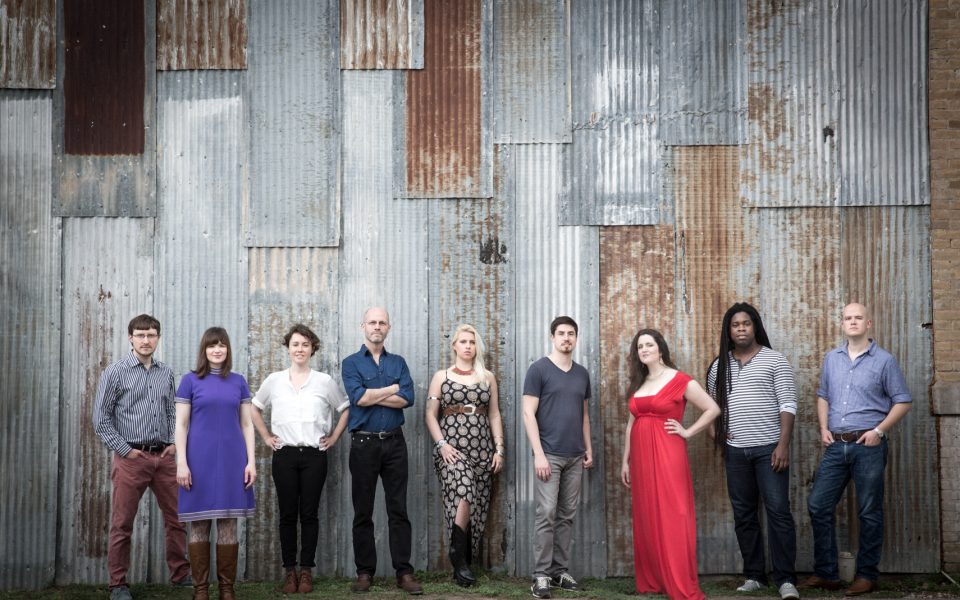Somewhere amid the throaty gasps, cinematic bass notes and eerie whistling, it became quite apparent that Roomful of Teeth ain’t your teen sister’s Pitch Perfect or “Glee”-style a capella group.
Amid students wisely avoiding finals crunch season, the experimental octet quickly eliminated all mental images of amateur-hour barbershop ditties by dweeby freshmen in liberal arts schools or snooze-y high school choirs. Roomful of Teeth replaced them with professional vocalists trained in Inuit throat singing and yodeling, among other voice-as-instrument techniques.
This a capella group, by the way, also collaborated with Kanye West and won a Grammy for its debut album that they funded via Kickstarter.
The main event of the evening at Wake Forest University’s Brendle Recital Hall on April 29 was a performance of group member Caroline Shaw’s composition Partita for 8 Voices, which won a Pulitzer. The New York Times’ magazine recently featured the piece among the 25 examples of “where music is going,” alongside the Hamilton soundtrack and Kendrick Lamar’s The Blacker the Berry. In the beginning of the piece vocalists abruptly begin with overlapping spoken word, a juxtaposition that makes zero sense, but by the end of the piece, the dissonance feels fitting.
Though broken into four distinct movements, the Partita is coherent as a single musical work. A narrative urgency untangles each building, chaotic phrase to ease back into central themes, never losing momentum or its ability to surprise.
A rapt audience, including a busful of UNCSA students packed into the front rows, the wackier Wake crowd (meaning, sans Sperrys),and an older enclave clustered in the back, ensured the joy of the performance wasn’t limited to Roomful of Teeth alone.
When the theater emptied for intermission, one audience member attempted mimicked some of Partita’s noises to their seatmate, then said, “I could do that.”
After a moment’s pause, though, they conceded, “Well, not like that.”
That’s a understatement. The first movement is mainly reminiscent of early church music, such as Gregorian chanting or polyphonic organum compositions from the 1100 and 1200s, ending in piercingly haunting minor unison in female voices as men provide anchoring bass, closing in quiet but powerful hums.
Aptly describing the main theme through the second movement may be impossible, but here goes: It sounded as if the group swallowed noise and then spit out angelic harmonies, eventually exploding into some kind of rebel yell. Bass vocalist Cameron Beauchamp used the mic to produce a sound like an Australian didgeridoo.
Several elements invisible to the audience seemed to anchor the performance throughout, mainly a tempo and sheet music. Only the tiniest foot taps gave away the governing rhythm, and the eight singers did have music stands in front of them, though there’s no telling what the notation looks like for such music.
The “courante” movement, which means “running” in French, aptly began with sharp gasps and “ah” noises, a breath rapidly passed back and forth among the vocalists, and culminating in the final movement, which returns to the main chord progression, adding into more chaotic spoken word and messing around with vocal fry effects. The audience, likely overwhelmed, provided barely adequate applause.
An intermission provided a short breath for the audience to process and prepare for the bizarrities ahead, a set of shorter works that delved into yodeling and opera.
In “Amid the Minotaurs,” probably the weirdest eight minutes of the night, Roomful of Teeth played with words just as much as with sounds, delivering lyrics like “your words are shampoo” and “beneath the purple tree rots poisonous mangoes” with the evident glee of a shared joke between the performers. At one point, a few vocalists mimicked airy bird calls; by then, most of the audience was on board enough with the weirdness to laugh at the noise.
Alto Virginia Warnken belted out a solo that would give Idina Menzel a run for her money, singing, “there is no subtlety in death, it’s like a hurricane” in an off-puttingly stirring interlude between all the wackiness.
Speaking of gorgeous voices: soprano Esteli Gomez’s hauntingly beautiful voice had a chance to shine through Italian operatic stylings during “Suonata.” She hit what sounded like a high C with delicate strength, precision and piercing clarity; a high note exactly as the soul wants to hear it sung.
The evening closed with “Quizassa” composed by Merrill Garbus of Tune-Yards, who borrows from the same eclectic mix of inspiration as Roomful of Teeth. The end product of their combined forces touched something primal with gibberish tonal chanting interrupted by nasal harmonies reminiscent of alt-J’s “Fitzpleasure” that wouldn’t be out of place sung while dancing around a campfire under a full moon.
Cartoonish shrieks and coughs morphed into the vocal equivalent of a guitar solo, in which Warnken screamed like a bona-fide rock star, punctuated by a hair toss. Immediately after the song finished, the entire audience shot up in a standing ovation for the beaming octet. No other reaction would do.
Join the First Amendment Society, a membership that goes directly to funding TCB‘s newsroom.
We believe that reporting can save the world.
The TCB First Amendment Society recognizes the vital role of a free, unfettered press with a bundling of local experiences designed to build community, and unique engagements with our newsroom that will help you understand, and shape, local journalism’s critical role in uplifting the people in our cities.
All revenue goes directly into the newsroom as reporters’ salaries and freelance commissions.


Leave a Reply